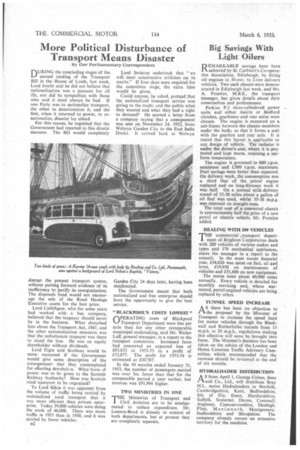More Political Disturbance of Big Savings With Transport Means Disaster Light Oilers
Page 42

If you've noticed an error in this article please click here to report it so we can fix it.
By Our Parliamentary Correspondent nUR1NG the concluding stages of the LI second reading of the Transport Bill in the House of Lords, last week, Lord Jowitt said he did not believe that nationalization was a panacea for all ills, nor did he sympathize with those who said it must always be bad, If one Party was to nationalize transport, the other to denationalize it, and the first, when it returned to power, to renationalize, disaster lay ahead.
For this reason, he regretted that the Government had resorted to this drastic measure. The Bill would completely disrupt the present transport system, without putting forward evidence of its inefficiency to justify its reorganization. The disposals fund would not encourage the sale of the Road Haulage Executive assets for the best price.
Lord Linlithgow, who for some years had worked with a bus company, believed that the taxpayec should never be in the business. What disturbed him about the Transport Act, 1947, and the other nationalization measures was that the unfortunate taxpayer was there to stand the loss. He was an equity shareholder without dividends.
Lord Elgin said Scotlanu would be more reassured if the Government would give some description of the arrangementthat they contemplated for effecting devoluticn. What form of power was to be given to the Scottish Railway Authority? How was Scottish road transport to be organized?
To Lord Silkin it was apparent from the volume of traffic being carried by nationalized road transport that it was more efficient than private enterprise. Today 39,000 vehicles were doing the work of 46,000. There was more traffic in 1951 than in 1950, and it was carried by fewer vehicles.
D2 Lord Swinton undertook that "we will meet constructive criticism on its merits." If four days were required for the committee stage, the extra time would be given.
Could anyone, he asked, pretend that the nationalized transport service was giving to the trader and the public what they wanted and what they had a right to demand? He quoted a letter from a company saying that a consignment was sent on November 24, 1952, from Welwyn Garden City to the East India Docks. It arrived back at Welwyn Garden City 24 days later, having been misdirected.
The Government meant that both nationalized and free enterprise should have the opportunity to give the best service.
"BLACKPOOL'S COSTS LOWEST"
OPERATING costs of Blackpool Transport Department were less per mile than for any other comparable municipal undertaking, said Mr. Walter Luff, general manager, in a report to the transport committee. Increased fares had converted an expected loss of £83,833 in 1952-53 to a profit of £33,877. The profit for 1953-54 is estimated at £30,787.
In the 10 months ended January 31, 1953, the number of passengers carried was over 3m. fewer than that for the comparable period a year earlier, but revenue was £91,994 higher.
TWO MINISTRIES IN ONE
THE Ministries of Transport and Civil Aviation are to be amalgamated to reduce expenditure. Mr. Lennox-Boyd is already in control of both departments, but at present they are completely separate.
































































































